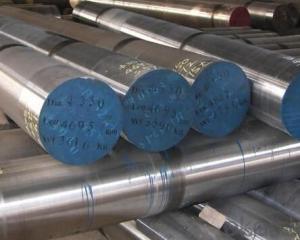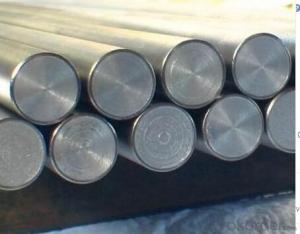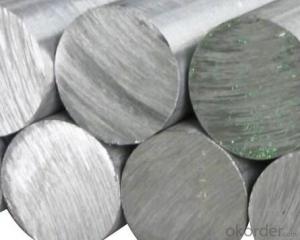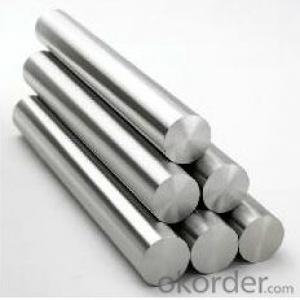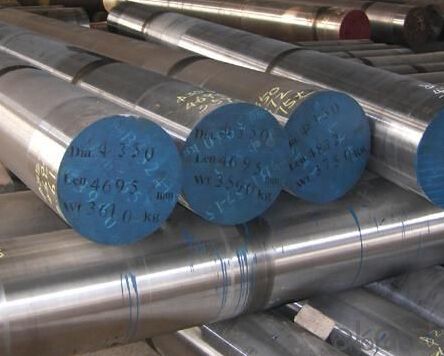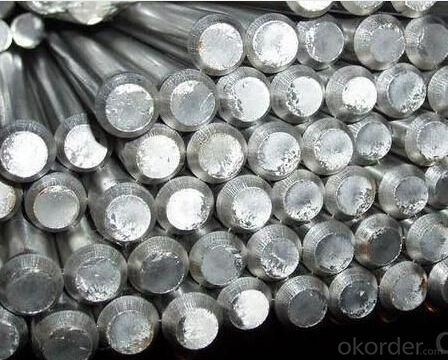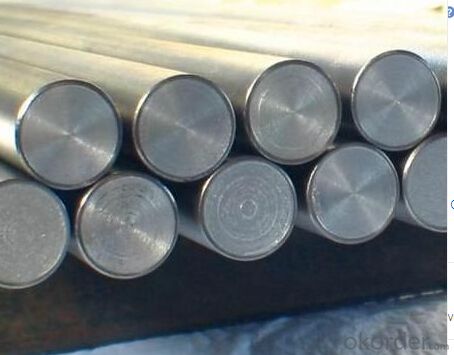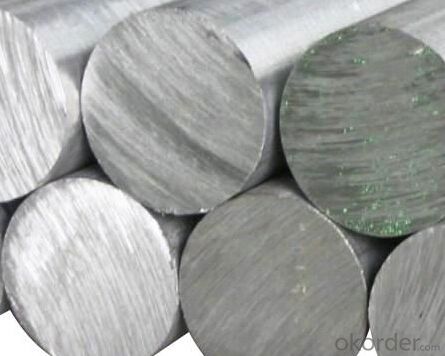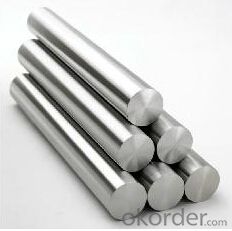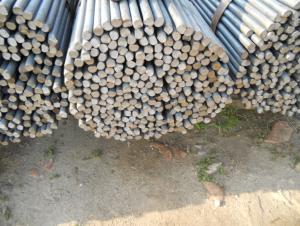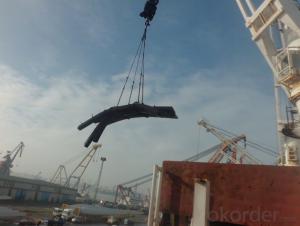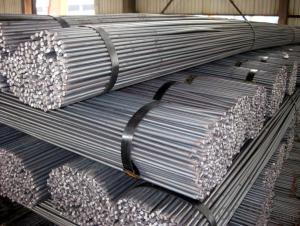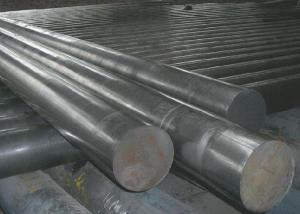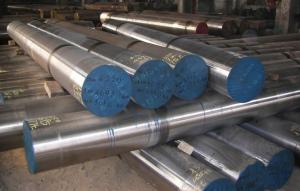Stainless Bearing Steel Round Bar
- Loading Port:
- China Main Port
- Payment Terms:
- TT or LC
- Min Order Qty:
- 50 m.t.
- Supply Capability:
- 1000 m.t./month
OKorder Service Pledge
OKorder Financial Service
You Might Also Like
Product Description:
OKorder is offering Stainless Bearing Steel Round at great prices with worldwide shipping. Our supplier is a world-class manufacturer of steel, with our products utilized the world over. OKorder annually supplies products to European, North American and Asian markets. We provide quotations within 24 hours of receiving an inquiry and guarantee competitive prices.
Product Applications:
Stainless Bearing Steel Round are ideal for structural applications and are widely used in the construction of buildings and bridges, and the manufacturing, petrochemical, and transportation industries.
Product Advantages:
OKorder's Stainless Bearing Steel Round are durable, strong, and resist corrosion.
Main Product Features:
· Premium quality
· Prompt delivery & seaworthy packing (30 days after receiving deposit)
· Corrosion resistance
· Can be recycled and reused
· Mill test certification
· Professional Service
· Competitive pricing
Specifications of Bearing Steel Round Bar
Grade | AISI 52100, ASTM E52100, DIN 1.3505,JIS SUJ2, GCr15 |
Dimensions | Diameter: 30-60mm Length: 2000-13000mm or as required |
Shape | Round Bar |
Type | Alloy Steel Bar |
Delivery Condition | Black Surface |
Material | Bearing Steel |
Technique | Hot Rolled |
Usage and Applications of Bearing Steel Round Bar
Bearing steels are used for ball and roller bearing applications and are comprised of low carbon steels and high carbon through harden able steel.
First the famous 1C-1.5Cr steel from which the majority of bearings are made. Its structure is apparently well-understood and the focus is on purity in order to avoid inclusions which initiate fatigue during rolling contact. Then there is the M50 steel and its variants, from which bearings which serve at slightly higher temperatures in aeroengines are manufactured, based on secondary-hardened martensite.
Tapered roller bearing are generally used to support combined load mainly consisting of radial load. Their cups are separable for easy assembling ,During mounting and using, radial clearance and axial clearance can be adjusted and preloaded mounting can be made.
Packaging & Delivery of Bearing Steel Round Bar
Packaging Detail: ASTM 52100 Steel in seaworthy packing or on customer request; Packed in bundles with standard export sea-worthy package or as customer require
Delivery Detail: 45 days after confirmed
Trade terms: FOB, CFR, CIF ou as customer's required
MOQ: 25 tons or at customer's demands. If the quantity is good, the price will be better.
Processing of Bearing Steel Round Bar
The processing of Bearing Steel Round Bar is hot rolled (strictly control sulphur, phosphorus and non-metallic inclusions content and distribution)
Chemical Composition of Bearing Steel Round Bar
C | Si | Mn | Cr | Ni | Cu |
Equal or less than | |||||
0.95-1.05 | 0.15-0.35 | 0.25-0.45 | Cr:1.40-1.65 | 0.30 | 0.25 |
All products' chemical composition and specification can be design according to customers' requirement.
Note of Bearing Steel Round Bar
1. According to national standard (GB) for our products, if not, supply according to national standards (GB) or agreement.
2. We can not only provide electric furnace +LF+VD and electros lag re-melting (ESR) steel forging materials, but also forging products of piece, bar, etc.
3. Our company is equipped with roll equipment and can provide our customers with roll billets or finished.
4. Please send us your detailed specifications when inquire. We will reply to you ASAP.
5. Certificate of quality is issued in English, in addition the normal terms, production process, the mechanical property (yield strength, tensile strength, elongation and hardness. forged ratio, UT test result, Grain size, heat treatment methods and the sample of is shown on the certificate of quality.
FAQ:
Q1: Why buy Materials & Equipment from OKorder.com?
A1: All products offered byOKorder.com are carefully selected from China's most reliable manufacturing enterprises. Through its ISO certifications, OKorder.com adheres to the highest standards and a commitment to supply chain safety and customer satisfaction.
Q4: What makes stainless steel stainless?
A4: Stainless steel must contain at least 10.5 % chromium. It is this element that reacts with the oxygen in the air to form a complex chrome-oxide surface layer that is invisible but strong enough to prevent further oxygen from "staining" (rusting) the surface. Higher levels of chromium and the addition of other alloying elements such as nickel and molybdenum enhance this surface layer and improve the corrosion resistance of the stainless material.
Q5: Can stainless steel rust?
A5: Stainless does not "rust" as you think of regular steel rusting with a red oxide on the surface that flakes off. If you see red rust it is probably due to some iron particles that have contaminated the surface of the stainless steel and it is these iron particles that are rusting. Look at the source of the rusting and see if you can remove it from the surface.
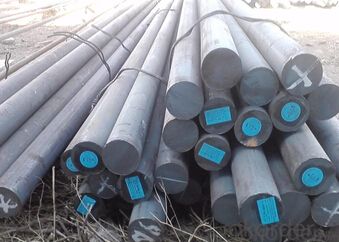
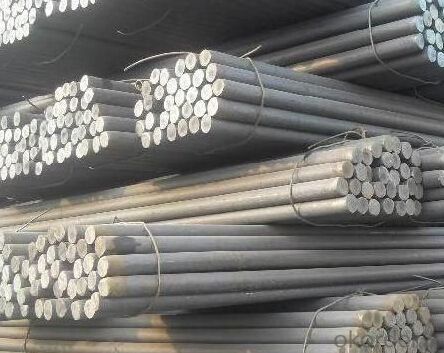
- Q: What are the challenges in machining special steel alloys?
- Special steel alloys pose several challenges when it comes to machining, primarily due to their unique properties and characteristics. The first major challenge is their high hardness, which is often enhanced through heat treatment to improve mechanical properties. As a result, traditional cutting tools wear out quickly or become dull, making it difficult to machine these alloys. Additionally, the high hardness increases the risk of tool breakage, leading to frequent tool changes and increased production downtime. Another challenge is the presence of abrasive elements in special steel alloys, such as chromium, tungsten, or vanadium. These elements can cause rapid tool wear and degradation, resulting in reduced cutting tool life and higher machining costs. Moreover, if not managed properly during the machining process, these abrasive elements can lead to poor surface finish and dimensional accuracy. Furthermore, special steel alloys have low thermal conductivity, making it challenging to dissipate the heat generated during machining. This can result in high temperatures at the cutting zone, causing thermal expansion and distortion of the workpiece. The heat also affects the cutting tool, reducing its efficiency and lifespan. Effective heat management is crucial to prevent workpiece deformation and maintain dimensional accuracy. Moreover, these steel alloys are prone to work hardening, meaning they become harder and more difficult to cut as the machining process progresses. Work hardening leads to increased cutting forces, tool wear, and reduced surface finish. To overcome this challenge, machining parameters such as cutting speed, feed rate, and depth of cut must be carefully optimized to avoid excessive work hardening. In conclusion, machining special steel alloys involves overcoming challenges such as high hardness, abrasive elements, low thermal conductivity, and work hardening. To address these challenges effectively, manufacturers need to use specialized cutting tools, efficient cooling and lubrication systems, optimize machining parameters, and carefully select machining strategies. By doing so, accurate and efficient machining of special steel alloys can be achieved.
- Q: What are the main applications of special steel in the power distribution industry?
- Special steel is widely used in the power distribution industry for various applications. One of the main applications is in the construction of transmission towers and electrical pylons. Special steel is preferred for these structures due to its high strength, durability, and resistance to corrosion. It ensures the safe and reliable transmission of electricity over long distances. Special steel is also used in the manufacturing of electrical transformers and generators. The steel's magnetic properties make it suitable for creating efficient and reliable power generation and distribution equipment. Additionally, special steel is used in the production of electrical connectors and conductors, which are essential for ensuring the efficient flow of electricity through power distribution systems. Overall, the main applications of special steel in the power distribution industry include transmission towers, electrical pylons, transformers, generators, and electrical connectors. These applications play a crucial role in maintaining a robust and reliable power grid, ensuring uninterrupted electricity supply to consumers.
- Q: What are the different coating and plating options for special steel?
- The different coating and plating options for special steel include electroplating, hot-dip galvanizing, powder coating, PVD (Physical Vapor Deposition) coating, and ceramic coating. Each option offers unique benefits such as increased corrosion resistance, improved aesthetics, enhanced durability, or specific functional properties, allowing the special steel to be tailored to various applications and environments. The choice of coating or plating depends on factors such as the desired outcome, budget, substrate material, and intended use of the special steel.
- Q: How does special steel perform under high temperatures?
- Special steel is specifically designed to perform exceptionally well under high temperatures. It exhibits excellent strength, hardness, and resistance to deformation, even when exposed to extreme heat. Additionally, special steel demonstrates remarkable resistance to oxidation and corrosion, making it highly suitable for applications that involve high temperatures, such as in the aerospace, automotive, and power generation industries.
- Q: How does electrical steel minimize energy losses in electrical devices?
- Electrical steel minimizes energy losses in electrical devices through its unique magnetic properties and composition. It is specifically designed to have low magnetic hysteresis and eddy current losses, resulting in reduced energy dissipation and improved overall efficiency. The grain-oriented structure of electrical steel aligns the magnetic domains along a specific direction, allowing for efficient magnetic flux flow and minimizing energy losses. Additionally, the thin insulation coating on electrical steel further reduces eddy currents, ensuring minimal power wastage and maximizing the performance of electrical devices.
- Q: Can special steel be used in aerospace turbine components?
- Aerospace turbine components, like blades, vanes, and disks, need strong materials to withstand tough conditions. Special steel, also known as high-performance alloy steel, fits the bill. It has excellent mechanical properties, like high strength, hardness, and temperature resistance. These qualities make it perfect for aerospace turbine components, which face extreme temperatures, pressures, and stress. Jet engines rely on turbine components to work properly, so they need materials that can handle the tough conditions. Special steel alloys, like nickel-based superalloys, are commonly used because they can maintain their strength and integrity at high temperatures. Plus, special steel is lightweight but strong, so it helps make durable yet light turbine components. This improves the efficiency and performance of aerospace systems. Special steel alloys also resist corrosion, oxidation, and fatigue, which are crucial for the long-term reliability and safety of turbine components. These materials go through rigorous testing and certification to meet aviation industry standards. In conclusion, special steel is a great choice for aerospace turbine components. Its exceptional mechanical properties and resistance to extreme conditions make it reliable and safe. It plays a vital role in ensuring the efficiency and safety of turbine systems in aerospace applications.
- Q: How does special steel contribute to the medical industry?
- Special steel contributes to the medical industry by providing the necessary materials for the production of medical equipment and devices. Its unique properties such as high strength, corrosion resistance, and biocompatibility make it ideal for manufacturing surgical instruments, implants, and prosthetics. Special steel also ensures the safety and effectiveness of medical tools, as it can withstand sterilization processes and maintain its integrity during procedures. Overall, special steel plays a crucial role in advancing medical technology and improving patient care.
- Q: How does special steel perform in tooling applications?
- Due to its unique properties and characteristics, special steel excels in tooling applications. Also known as tool steel, this type of steel is specifically designed and manufactured to endure the challenging conditions of tooling applications. One major advantage of special steel is its exceptional hardness. Tooling applications often involve cutting, shaping, and forming tough materials, and the hardness of special steel enables it to withstand the extreme pressures and forces involved in these processes effectively. Additionally, this hardness helps maintain the cutting edges' sharpness for extended periods, ensuring consistent and precise performance. Moreover, special steel demonstrates excellent resistance to wear. Tooling applications typically involve repetitive and abrasive actions, which can cause significant wear and tear on the tools. However, the wear resistance of special steel ensures that the tools maintain their performance and longevity, reducing the need for frequent replacements and downtime. Another crucial aspect of special steel is its remarkable toughness. Tooling applications often subject the tools to sudden impacts and shock loads. Special steel's toughness allows it to absorb these impacts without fracturing or breaking, making it highly reliable and durable in such applications. In addition, special steel offers good heat resistance and dimensional stability. Tooling applications frequently involve high temperatures, and special steel's ability to withstand heat prevents it from losing its hardness and other mechanical properties. This ensures consistent performance and dimensional stability, resulting in accurate and precise tooling. Lastly, special steel is also recognized for its corrosion resistance. Tooling applications may expose the tools to moisture, chemicals, or harsh environments, which can lead to corrosion and degradation. The corrosion resistance of special steel protects the tools from these corrosive elements, prolonging their lifespan and maintaining their performance. To conclude, special steel's hardness, wear resistance, toughness, heat resistance, dimensional stability, and corrosion resistance make it highly effective in tooling applications. These properties enable special steel tools to withstand the demanding conditions of tooling applications, ensuring reliable and long-lasting performance.
- Q: How does the demand for special steel vary across different regions?
- The demand for special steel varies across different regions due to several factors such as industrial development, infrastructure projects, and manufacturing activities. Regions with robust manufacturing sectors and infrastructure development tend to have higher demand for special steel as it is used in various applications like automotive, construction, and machinery. Additionally, regions with a higher focus on technological advancements and innovation may also have a greater demand for special steel due to its unique properties and capabilities. However, regions with limited industrial activities or dependence on specific sectors may exhibit lower demand for special steel. Overall, the demand for special steel is influenced by the specific economic and industrial characteristics of each region.
- Q: What are the main characteristics of pressure vessel steel forgings?
- Pressure vessel steel forgings possess several key features that render them suitable for utilization in pressure vessels. Firstly, these forgings are renowned for their exceptional strength and toughness. This attribute is of utmost importance as pressure vessels typically encounter significant internal pressure, necessitating steel capable of withstanding such force without deformation or rupture. Meticulous design and manufacturing ensure that the forgings possess the requisite strength and toughness to endure these pressures. Secondly, pressure vessel steel forgings exhibit remarkable resistance to corrosion. Given that pressure vessels frequently house corrosive fluids or gases, it becomes imperative for the steel employed in their construction to possess corrosion resistance. This feature guarantees the durability and dependability of the pressure vessel. The steel forgings are often crafted with specific alloying elements that enhance their resistance to corrosion. A further notable characteristic of pressure vessel steel forgings lies in their ability to retain their mechanical properties at elevated temperatures. Pressure vessels may be subjected to heightened temperatures due to the nature of the processes or fluids they contain. The forgings are designed to maintain their strength and toughness even in these high-temperature conditions, thereby ensuring the safety and reliability of the pressure vessel. Moreover, pressure vessel steel forgings typically undergo stringent quality control measures during their manufacturing process. This is essential to ensure that the forgings meet the prescribed standards and specifications for pressure vessel applications. The manufacturing process incorporates comprehensive inspections, testing, and documentation to guarantee compliance with the necessary quality and safety requirements. In summary, the primary characteristics of pressure vessel steel forgings encompass high strength and toughness, exceptional corrosion resistance, the ability to endure high temperatures, and stringent quality control measures. These attributes render pressure vessel steel forgings ideal for utilization in pressure vessels, providing the requisite strength, reliability, and safety demanded by such applications.
Send your message to us
Stainless Bearing Steel Round Bar
- Loading Port:
- China Main Port
- Payment Terms:
- TT or LC
- Min Order Qty:
- 50 m.t.
- Supply Capability:
- 1000 m.t./month
OKorder Service Pledge
OKorder Financial Service
Similar products
Hot products
Hot Searches
Related keywords
